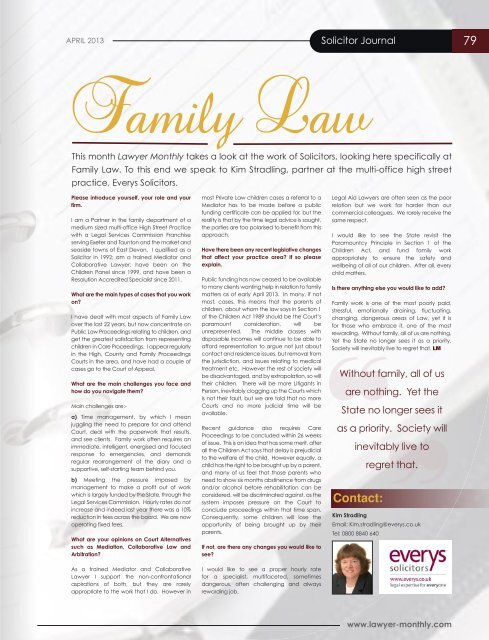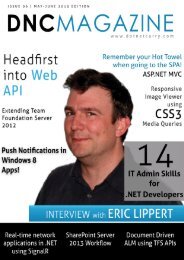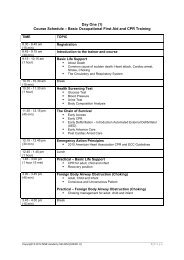Back Issue - Amazon Web Services
Back Issue - Amazon Web Services
Back Issue - Amazon Web Services
You also want an ePaper? Increase the reach of your titles
YUMPU automatically turns print PDFs into web optimized ePapers that Google loves.
APRIL 2013Solicitor Journal 79Family LawThis month Lawyer Monthly takes a look at the work of Solicitors, looking here specifically atFamily Law. To this end we speak to Kim Stradling, partner at the multi-office high streetpractice, Everys Solicitors.Please introduce yourself, your role and yourfirm.I am a Partner in the family department of amedium sized multi-office High Street Practicewith a Legal <strong>Services</strong> Commission Franchiseserving Exeter and Taunton and the market andseaside towns of East Devon. I qualified as aSolicitor in 1992; am a trained Mediator andCollaborative Lawyer; have been on theChildren Panel since 1999, and have been aResolution Accredited Specialist since 2011.What are the main types of cases that you workon?I have dealt with most aspects of Family Lawover the last 22 years, but now concentrate onPublic Law Proceedings relating to children, andget the greatest satisfaction from representingchildren in Care Proceedings. I appear regularlyin the High, County and Family ProceedingsCourts in the area, and have had a couple ofcases go to the Court of Appeal.What are the main challenges you face andhow do you navigate them?Main challenges are:-a) Time management, by which I meanjuggling the need to prepare for and attendCourt, deal with the paperwork that results,and see clients. Family work often requires animmediate, intelligent, energised and focusedresponse to emergencies, and demandsregular rearrangement of the diary and asupportive, self-starting team behind you.b) Meeting the pressure imposed bymanagement to make a profit out of workwhich is largely funded by the State, through theLegal <strong>Services</strong> Commission. Hourly rates do notincrease and indeed last year there was a 10%reduction in fees across the board. We are nowoperating fixed fees.What are your opinions on Court Alternativessuch as Mediation, Collaborative Law andArbitration?As a trained Mediator and CollaborativeLawyer I support the non-confrontationalaspirations of both, but they are rarelyappropriate to the work that I do. However inmost Private Law children cases a referral to aMediator has to be made before a publicfunding certificate can be applied for, but thereality is that by the time legal advice is sought,the parties are too polarised to benefit from thisapproach.Have there been any recent legislative changesthat affect your practice area? If so pleaseexplain.Public funding has now ceased to be availableto many clients wanting help in relation to familymatters as of early April 2013. In many, if notmost, cases, this means that the parents ofchildren, about whom the law says in Section 1of the Children Act 1989 should be the Court’sparamount consideration, will beunrepresented. The middle classes withdisposable incomes will continue to be able toafford representation to argue not just aboutcontact and residence issues, but removal fromthe jurisdiction, and issues relating to medicaltreatment etc. However the rest of society willbe disadvantaged, and by extrapolation, so willtheir children. There will be more Litigants inPerson, inevitably clogging up the Courts whichis not their fault, but we are told that no moreCourts and no more judicial time will beavailable.Recent guidance also requires CareProceedings to be concluded within 26 weeksof issue. This is an idea that has some merit, afterall the Children Act says that delay is prejudicialto the welfare of the child. However equally, achild has the right to be brought up by a parent,and many of us feel that those parents whoneed to show six months abstinence from drugsand/or alcohol before rehabilitation can beconsidered, will be discriminated against, as thesystem imposes pressure on the Court toconclude proceedings within that time span.Consequently, some children will lose theopportunity of being brought up by theirparents.If not, are there any changes you would like tosee?I would like to see a proper hourly ratefor a specialist, multifaceted, sometimesdangerous, often challenging and alwaysrewarding job.Legal Aid Lawyers are often seen as the poorrelation but we work far harder than ourcommercial colleagues. We rarely receive thesame respect.I would like to see the State revisit theParamountcy Principle in Section 1 of theChildren Act, and fund family workappropriately to ensure the safety andwellbeing of all of our children. After all, everychild matters.Is there anything else you would like to add?Family work is one of the most poorly paid,stressful, emotionally draining, fluctuating,changing, dangerous areas of Law, yet it isfor those who embrace it, one of the mostrewarding. Without family, all of us are nothing.Yet the State no longer sees it as a priority.Society will inevitably live to regret that. LMWithout family, all of usare nothing. Yet theState no longer sees itas a priority. Society willContact:Kim Stradlinginevitably live toEmail: Kim.stradling@everys.co.ukTel: 0800 8840 640regret that.www.lawyer-monthly.com
















